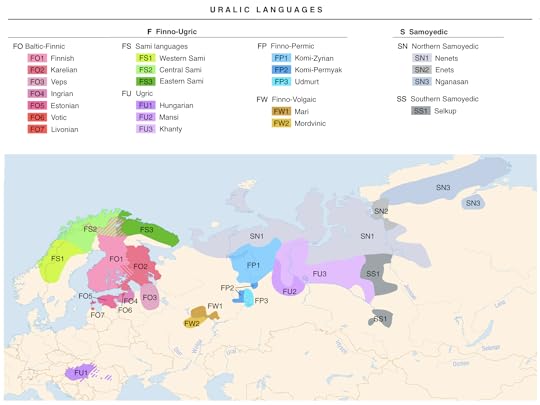Europe’s Non-Indo-European Languages

Episode 13 Europe’s Non-Indo-European Languages
Language Families of the World
Dr John McWhorter
Film Review
Besides Indo-European languages, Caucasian (see The Caucasian Languages) and Uralic languages are also spoken in Europe. The main Uralic languages are Hungarian, Finnish, Estonian, Sami (spoken in the region formerly known as Lapland in northern Finland), Mari (spoken in the Mari republic of the Russian Federation) and Mordivinic (spoken in the Mordovia Republic of the Russian Federation). Uralic languages most likely predated Russian, and the Russian language has adopted the Uralic practice of using a preposition, rather than a verb to designate possession.
McWhorter believes the Uralic language family first emerged in Russia west of the Ural mountains. Because the Uralic languages are far older than Indo-European languages, the differences between them are far greater. Linguists believe Uralic speakers inhabited most of Western Europe before the arrival of Indo-European speakers. Hungarian speakers were the last Uralic speakers to arrive when aggressive Hun migrants forced them from their Siberian homeland.
Uralic languages all use separate verb prefixes and suffixes to indicate both tense and the identity of the person(s) performing the action (I,you, he/she/it, we they). In addition, their nouns have case markings indicating position and direction, as well as subject, object and possession. Owing to the absence of invasion, occupation, etc, requiring foreign adults to learn Uralic languages (as with English and Persian), all employ extremely irregular grammatical principles.
However, like English, their nouns have no genders. Likewise written Uralic languages are spelled like they sound, which McWhorter credits for Finnish children learning to read much younger than other European children.
All Uralic language have an extensive written literature.
Film can be viewed free with a library card on Kanopy.
https://www.kanopy.com/en/pukeariki/watch/video/6120000/6120022
The Most Revolutionary Act
- Stuart Jeanne Bramhall's profile
- 11 followers



